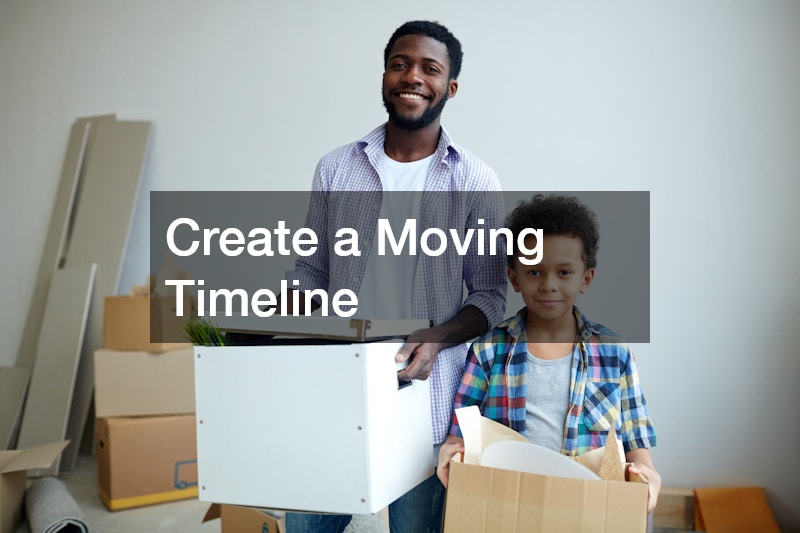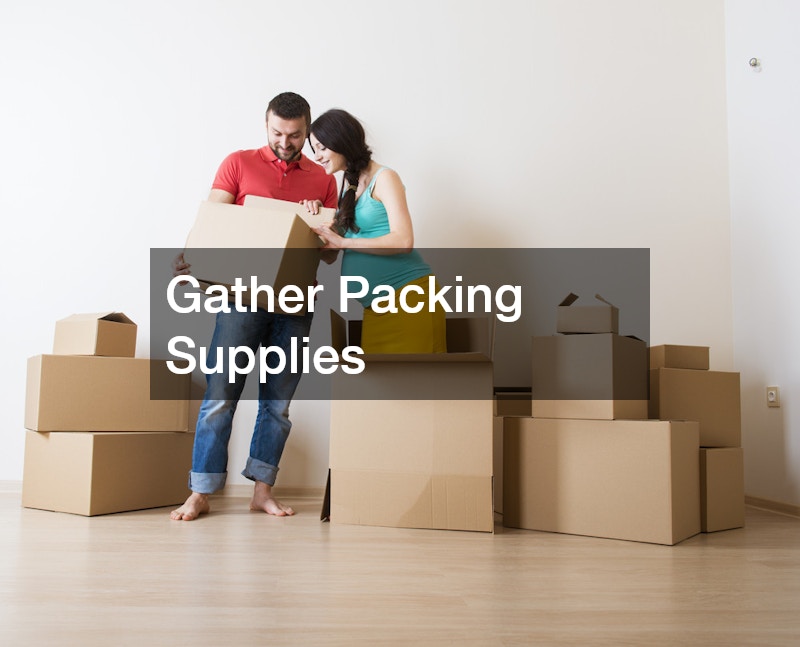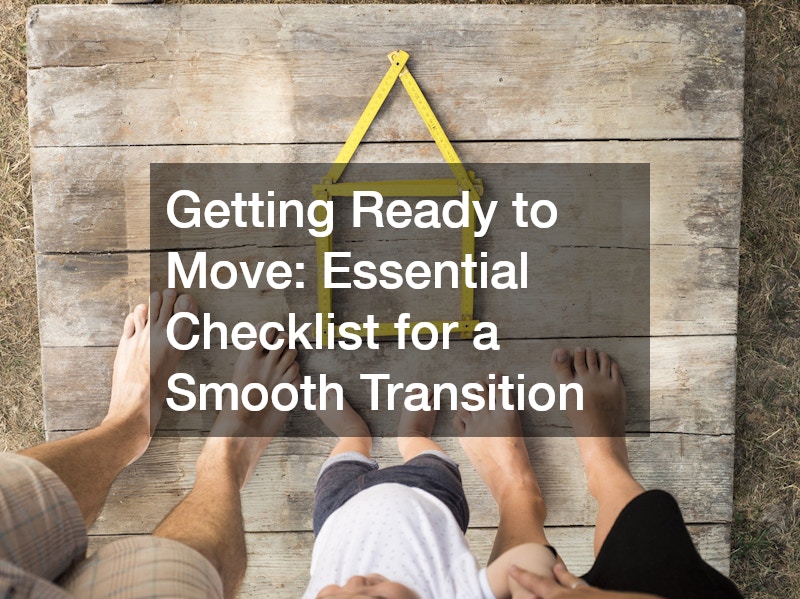Are you thinking about making a move? Whether you are relocating for a new job, downsizing, or simply craving a change of scenery, the process of moving can be both exciting and overwhelming. From finding the perfect real estate for sale to settling into your new home, there are many steps involved in a successful move. In this comprehensive guide, we will walk you through everything you need to know about getting ready to move.
Create a Moving Timeline

When you are getting ready to move, one of the first things you should do is create a detailed moving timeline. This timeline will help you stay organized and ensure that you don’t forget any important tasks along the way. Start by researching real estate for sale in your desired location and make a list of potential properties to visit. Once you have found your new home, set a moving date and work backward from there to create a schedule of tasks you need to complete before the big day.
Next, make a list of all the services you will need, such as local movers or moving companies, and start reaching out to get quotes. This will help you budget for the move and ensure that you have everything in place when the time comes. It’s also a good idea to start decluttering your current home early in the process. This will make packing and moving much easier and help you start fresh in your new space.
By setting up a moving timeline, you can break down the process into manageable steps and avoid feeling overwhelmed. This will help you stay on track and ensure a smooth transition to your new home by following proper real estate law.
Set a Moving Budget
When getting ready to move, setting a budget is essential to avoid any financial surprises along the way. Start by researching real estate advisory services in your area to get an idea of the costs associated with buying or renting a new home. In addition to the cost of the new property, you will also need to budget for moving expenses, such as packing supplies, transportation, and professional movers.
Creating a moving budget will help you determine how much you can afford to spend on your move and where you may need to cut costs. Be sure to factor in any unexpected expenses that may arise, such as temporary storage or last-minute utilities setup fees. By planning ahead and sticking to your budget, you can make your move as stress-free as possible.
Remember to keep track of your expenses as you go and make adjustments as needed to stay within your budget. This will help you avoid any financial strain and enjoy a smooth transition to your new home.
Declutter Your Home
Before you start getting ready to move and start packing, take the time to declutter your home and get rid of any items you no longer need or want. This will not only make packing and moving easier but also help you start fresh in your new space. Start by going through each room and making piles of items to keep, donate, sell, or throw away.
For items you no longer want, consider hosting a garage sale or listing them online to make some extra cash. You can also donate gently used items to local charities or shelters in need. Decluttering your home will not only reduce the number of items you need to pack but also help you create a more organized and stress-free living environment.
By decluttering before your move, you can start fresh in your new home and avoid bringing unnecessary items with you. This will make unpacking and settling into your new space much easier and more enjoyable. Additionally, consider involving your family in the decluttering process, encouraging kids to sort through their toys and clothes. This not only teaches responsibility but also helps them understand the value of giving to others, making the transition feel more collaborative and positive for everyone involved.
Gather Packing Supplies

When getting ready to move, one of the most important tasks is gathering all the necessary packing supplies. Start by collecting sturdy boxes in various sizes, packing tape, bubble wrap, packing peanuts, and markers for labeling. You can often find free boxes at local grocery stores, liquor stores, or moving companies.
Consider investing in specialty boxes for fragile items or valuable possessions to ensure they are well protected during the move. You may also need furniture blankets, mattress covers, and wardrobe boxes to transport your belongings safely. Having the right packing supplies on hand will help you pack efficiently and protect your items during transit.
Make a list of all the packing supplies you will need and start gathering them well in advance of your move. This will give you plenty of time to secure everything you need and avoid any last-minute scrambling.
Start Packing Early
One of the keys to successful while getting ready to move is starting the packing process early. A residential mover recommends to begin by packing items you don’t use regularly, such as out-of-season clothing, books, or decorative items. Label each box with its contents and the room it belongs in to make unpacking easier once you arrive at your new home.
For fragile items, be sure to wrap them securely in bubble wrap or packing paper and pack them carefully to avoid damage during transit. Consider packing a moving day essentials box with items you will need right away, such as toiletries, bedding, and basic kitchen supplies. This will help you settle into your new home without having to unpack everything at once.
Starting the packing process early will help you stay organized and reduce stress as moving day approaches. Pace yourself and tackle one room at a time to make the process more manageable and efficient. Additionally, involve your family in the packing process, assigning tasks based on age and ability. This can not only lighten your workload but also make it a fun, collaborative effort, creating shared experiences that foster teamwork and connection during this transitional period.
Label Everything
When getting ready to move, labeling your boxes is crucial to staying organized and ensuring a smooth transition to your new home. Use color-coded labels or markers to indicate which room each box belongs in and what items are inside. This will make unpacking much easier and help you locate specific items when needed.
Consider creating a master inventory list of all your boxes and their contents to keep track of everything during the move. This will also help you identify any missing items once you arrive at your new home. Be sure to label fragile items as such and stack boxes with care to avoid damage during transportation.
Labeling everything will streamline the unpacking process and help you settle into your new home quickly and efficiently. Take the time to label each box accurately and clearly to avoid any confusion or misplaced items.
Notify Change of Address

As you’re getting ready to move, don’t forget to notify all relevant parties of your change of address. Start by updating your address with the post office to ensure that your mail is forwarded to your new home. Next, inform banks, credit card companies, insurance providers, and any other important contacts of your upcoming move.
Remember to update your address with online retailers, subscription services, and any other companies you regularly receive mail from. It’s also a good idea to notify friends and family of your new address so they can stay in touch. By taking care of this important task early, you can avoid any delays in receiving important mail after your move.
Notify all necessary parties of your change of address well in advance of your move to ensure a seamless transition to your new home. This will help you stay connected and informed as you settle into your new space.
Set Up Utilities in Advance
Before moving day, be sure to set up utilities in your new home to ensure you have essential services up and running right away. Contact local plumbers or utility companies to schedule the activation of electricity, gas, water, internet, and any other necessary services. Make sure to coordinate the timing of the utility setup to coincide with your move-in date.
Consider scheduling a professional to install or check any appliances in your new home to ensure they are in good working order. Don’t forget to update your billing information and contact details with each utility provider to avoid any service interruptions or billing issues. Setting up utilities in advance will help you settle into your new home smoothly and comfortably.
By arranging for utilities to be set up before your move, you can avoid any inconvenience and enjoy a seamless transition to your new home. Stay organized and proactive in coordinating your utility services to make your move as stress-free as possible.
Consider Temporary Storage
If you are downsizing or need extra space during your move, consider renting a temporary storage unit. Contact local storage facilities or mobile storage container companies to inquire about availability, sizes, and rental rates. Temporary storage can provide a safe and secure space to keep belongings that won’t fit in your new home or are not immediately needed.
Before getting ready to move and renting a storage unit, make an inventory of the items you plan to store and consider how long you will need the storage space. Label boxes and furniture items clearly to make retrieval easy when needed. Be sure to choose a storage facility with good security measures to protect your belongings while they are in storage.
Temporary storage can be a convenient solution for storing excess items during your move and help you declutter your new home before settling in. Explore your options and choose a storage solution that meets your needs and budget.
Prepare Your New Home
Before getting ready to move into your new home, take the time to prepare the space for your arrival. Arrange for professional window cleaning companies to clean the windows and let in natural light. Consider hiring a cleaning service to deep clean the home before you move in to ensure a fresh start.
If needed, schedule any necessary repairs or renovations before moving day to avoid any disruptions once you are settled. Plan the layout of your furniture and belongings in advance to make unpacking and arranging easier. Set up any necessary services or installations, such as internet and cable, to have everything ready when you arrive.
Preparing your new home ahead of time will help you transition smoothly and settle in comfortably. Take the time to make your new space feel welcoming and personalized to create a positive moving experience.
Settle In and Celebrate

After all the hard work of getting ready to move, it’s time to finally settle into your new home and celebrate this exciting new chapter in your life. Unpack your belongings, arrange your furniture, and make your new space feel like home. Take the time to explore your new neighborhood, meet your neighbors, and start making memories in your new community.
Consider treating yourself to a meal at a local family friendly restaurant to celebrate your move and relax after all the hustle and bustle. Host a housewarming party or invite friends and family over to share in your new space. Take the opportunity to enjoy your new surroundings and savor the accomplishment of a successful move.
Settling into your new home is a time to unwind, recharge, and embrace the excitement of a fresh start. Take the time to appreciate all the hard work that went into moving and enjoy this new beginning.
As you can see, getting ready to move involves a series of important steps and considerations to ensure a smooth and successful transition to your new home. From creating a moving timeline and setting a budget to packing, labeling, and notifying relevant parties, each task plays a crucial role in the moving process. By following this comprehensive guide and staying organized throughout each stage of your move, you can minimize stress and enjoy a seamless transition to your new space. Remember to take time to settle in, celebrate your accomplishment, and make your new house feel like home. With careful planning and preparation, your move can be a positive and rewarding experience.





